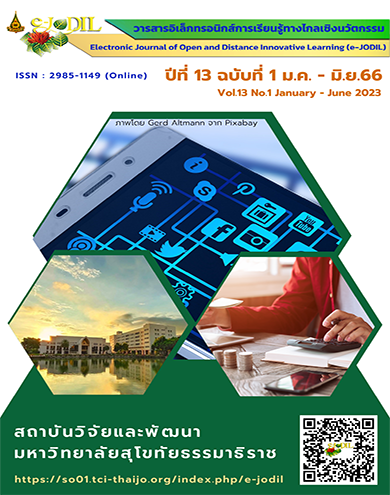ปัจจัยเชิงสาเหตุของการบริหารลูกค้าสัมพันธ์ที่มีอิทธิพลต่อผลการดำเนินงานของโรงแรมในประเทศไทย ผ่านความสามารถเชิงพลวัตในการบริหารลูกค้าสัมพันธ์ และความสำเร็จในการบริหารลูกค้าสัมพันธ์
Main Article Content
บทคัดย่อ
งานวิจัยนี้มีวัตถุประสงค์ คือ (1) เพื่อพัฒนาความสัมพันธ์โมเดลเชิงสาเหตุของปัจจัยเชิงสาเหตุของการบริหารลูกค้าสัมพันธ์ที่มีอิทธิพลต่อผลการดำเนินงานของโรงแรมในประเทศไทย ผ่านความสามารถเชิงพลวัตในการบริหารลูกค้าสัมพันธ์ และความสำเร็จในการบริหารลูกค้าสัมพันธ์ (2) เพื่อตรวจสอบความสอดคล้องของโมเดลความสัมพันธ์เชิงสาเหตุของปัจจัยเชิงสาเหตุของการบริหารลูกค้าสัมพันธ์ที่มีอิทธิพลต่อผลการดำเนินงานของโรงแรมในประเทศไทย ผ่านความสามารถเชิงพลวัตในการบริหารลูกค้าสัมพันธ์ และความสำเร็จในการบริหารลูกค้าสัมพันธ์
ผู้วิจัยใช้ระเบียบวิธีการศึกษาวิจัยเชิงปริมาณ การวิจัยเชิงปริมาณใช้แบบสอบถามเป็นเครื่องมือในการเก็บรวบรวมข้อมูลจากผู้บริหารธุรกิจโรงแรมในระดับ 3 ดาวจนถึงระดับ 5 ดาว ในประเทศไทย จำนวน 269 โรงแรม สถิติที่ใช้ในการวิเคราะห์ข้อมูล ได้แก่ ความถี่ ร้อยละ ส่วนเบี่ยงเบนมาตรฐาน และการวิเคราะห์โมเดลสมการโครงสร้าง
ผลการวิจัยพบว่า (1) การมุ่งเน้นลูกค้า ความสามารถในการบริหารความรู้ และความสามารถด้านสื่อสังคมการบริหารลูกค้าสัมพันธ์มีอิทธิพลทางบวกต่อความสามารถด้านพลวัตในการบริหารลูกค้าสัมพันธ์ แต่เทคโนโลยีการบริหารลูกค้าสัมพันธ์ไม่มีอิทธิพลต่อความสามารถเชิงพลวัตในการบริหารลูกค้าสัมพันธ์ (2) เทคโนโลยีการบริหารลูกค้าสัมพันธ์ การมุ่งเน้นลูกค้า ความสามารถในการบริหารความรู้ ความสามารถด้านสื่อสังคมในการบริหารลูกค้าสัมพันธ์ และความสามารถเชิงพลวัตในการบริหารลูกค้าสัมพันธ์มีอิทธิพลทางบวกต่อความสำเร็จในการบริหารลูกค้าสัมพันธ์ และ (3) ความสามารถเชิงพลวัตในการบริหารลูกค้าสัมพันธ์ และความสำเร็จในการบริหารลูกค้าสัมพันธ์มีอิทธิพลทางบวกต่อผลการดำเนินงานของโรงแรม
Downloads
Article Details

อนุญาตภายใต้เงื่อนไข Creative Commons Attribution-NonCommercial-NoDerivatives 4.0 International License.
บทความ ข้อความ ภาพประกอบ ตารางประกอบ ที่ตีพิมพ์ในวารสารเป็นความคิดเห็นและความรับผิดชอบของผู้เขียนแต่เพียงผู้เดียว ไม่เกี่ยวข้องกับมหาวิทยาลัยสุโขทัยธรรมาธิราชแต่อย่างใด
บทความที่เสนอพิจารณาในวารสาร e-JODIL ต้องเป็นบทความที่ไม่เคยส่งไปลงพิมพ์ เผยแพร่ หรืออยู่ระหว่างการพิจารณาของวารสารอื่น
กองบรรณาธิการขอสงวนสิทธิ์ในการพิจารณาและตัดสินการตีพิมพ์บทความในวารสาร
เอกสารอ้างอิง
ธนาคารกสิกรไทย. (2561). เทรนด์ท่องเที่ยวดี SME รีบคว้าโอกาส K SME Analysis สืบค้นจาก https://kasikornbank.com/th/business/sme/KSMEKnowledge/article/KSMEAnalysis/Documents/Tourism-trend_SME-Opportunity.pdf
ส่วนเศรษฐกิจรายสาขา ศูนย์วิจัยเศรษฐกิจ ธุรกิจและเศรษฐกิจฐานราก ธนาคารออมสิน. (2562). สถานการณ์ธุรกิจโรงแรมปี 2561-2562. สืบค้นจาก https://www.gsbresearch.or.th/wp-content/uploads/2018/12/IN_hotel_11_61_detail.pdf
สำนักงานสนับสนุนกองทุนวิจัย. (2562). การจัดการท่องเที่ยวโดยชุมชน. ประชาคมวิจัย, 57.
Al-Azzam, A. F. M. (2016). The Impact of Customer Relationship Management on Hotels Performance in Jordan. International Journal of Business and Social Science, 7(4), 200-210.
Arasli, H., & Alphun, C. (2019). The Impact of Intrinsic Motivation in the Relationship between Transcendental Leadership and Work Engagement: Evidence from Hotel Industry. In Paper Presented at the 9th Advances in Hospitality and Tourism Marketing and Management Conference Proceedings. Portsmouth: University of Portsmouth.
Barney, J. (1991). Firm Resources and Sustained Competitive Advantage. Journal of Management, 17(1), 99-120.
Cambra-Fierro, J. J., Centeno, E., Olavarria, A., & Vazquez-Carrasco, R. (2017). Success factors in a CRM strategy: technology is not all. Journal of Strategic Marketing, 25(4), 316-333. doi: 10.1080/0965254X .2016.1148760
Desai, D., Sahu, S., & Sinha, P. K. (2007). Role of Dynamic Capability and Information Technology in Customer Relationship Management: A study of Indian Companies. Vikalpa, 32(4), 45-62.
Diffley, S., McCole, P., & Carvajal-Trujillo, E. (2018). Examining Social Customer Relationship Management among Irish Hotels. International Journal of Contemporary Hospitality Management, 30(2), 1072-1091.
Dost, M. K. B., Akram, M. W., Ali, M., & Sonum, S. (2017). Significance of Customer Relationship Management and Advertisement on Consumer Buying Behaviour in Entrepreneurial Apparel Firms. Science International, 29(5), 1043-1043.
El Mehelmi, H., & Sadek, H. (2019). Investigating the Usage of Social Customer Relationship Management (SCRM) and Its Impact on Firm Performance in the Mobile Telecommunication Services: Egypt Case. Journal of Business and Retail Management Research, 13(03).
El Sawy, O. A., Malhotra, A., Park, Y., & Pavlou, P. A. (2010). Research Commentary—Seeking the Configurations of Digital Ecodynamics: It Takes Three to Tango. Information Systems Research, 21(4), 835-848.
Garrido-Moreno, A., Lockett, N., & García-Morales, V. (2014). Paving the Way for CRM Success: The mediating Role of Knowledge Management and Organizational Commitment. Information & Management, 51(8), 1031-1042. doi: 10.1016/j.im.2014.06.006
Hair, J., Black, W., Anderson, R., & Babin, B. (2019). Multivariate Data Analysis (8, ilustra ed.).
Kaplan, R. S., & Norton, D. P. (1992). The Balanced Scorecard: Measures That Drive Performance. Harvard Business Review, 70(1), 71-79.
Knight, G. A., & Cavusgil, S. T. (2004). Innovation, Organizational Capabilities, and the Born-Global Firm. Journal of International Business Studies, 35(2), 124-141.
Küçükoğlu, M. T., & Pınar, R. İ. (2015). Effect of CRM’s Critical Success Factors on Company Performance. Management, 3(1-2), 41-49.
Malthouse, E. C., Haenlein, M., Skiera, B., Wege, E., & Zhang, M. (2013). Managing Customer Relationships in the Social Media Era: Introducing the Social CRM House. Journal of Interactive Marketing, 27(4), 270-280.
Mohammed, A. A., Basri, B. R., & Shaharuddin, B. T. (2013). Assessing the Influence of Customer Relationship Management (CRM) Dimensions on Organization Performance: An Emperical Study in the Hotel Industry. Journal of Hospitality and Tourism Technology, 4(3), 228-247. doi:doi:10.1108/JHTT-01-2013-0002
Mohammed, A. A., Rashid, B. B., & Tahir, S. B. (2014). Customer Relationship Management (CRM) Technology and Organization Performance: Is Marketing Capability a Missing Link? an Empirical Study in the Malaysian Hotel Industry. Asian Social Science, 10(9), 197.
Mohammed, A. A., Rashid, B. B., & Tahir, S. B. (2017). Customer Relationship Management and Hotel Performance: the Mediating Influence of Marketing Capabilities—Evidence from the Malaysian Hotel Industry. Information Technology & Tourism, 17(3), 335-361. doi:10.1007/s40558-017-0085-4
Nam, D., Lee, J., & Lee, H. (2018). Business Analytics Use in CRM: A Nomological Net from IT Competence to CRM Performance. International Journal of Information Management, 45, 233-245. doi:https:// doi.org/10.1016/j.ijinfomgt.2018.01.005
Nunnally, J. C. (1978). Psychometric Theory (2nd ed.). New York: McGraw-Hill.
Penrose, E. T. (2009). The Theory of the Growth of the Firm. United Kingdom: Oxford University Press.
Peters, L. D., Pressey, A. D., & Greenberg, P. (2010). The Impact of CRM 2.0 on Customer Insight. Journal of Business & Industrial Marketing, 25(6), 410-419.
Rapp, A., Trainor, K. J., & Agnihotri, R. (2010). Performance Implications of Customer-Linking Capabilities: Examining the Complementary Role of Customer Orientation and CRM Technology. Journal of Business Research, 63(11), 1229-1236. doi: 10.1016/j.jbusres.2009.11.002
Sigala, M. (2017). Collaborative Commerce in Tourism: Implications for Research and Industry. Current Issues in Tourism, 20(4), 346-355.
Soltani, Z., Zareie, B., Milani, F. S., & Navimipour, N. J. (2018). The Impact of the Customer Relationship Management on the Organization Performance. The Journal of High Technology Management Research, 29(2), 237-246.
Thai Hotels Association. (2017). Thailand Standard Hotels Directory 2017. in Thailand Standard Hotel Directory 2017. Retrieved from http://www.thaihotels.org/16679475/hotel-standard
Thakur, R., & Workman, L. (2016). Customer Portfolio Management (CPM) for Improved Customer Relationship Management (CRM): Are Your Customers Platinum, Gold, Silver, or Bronze?. Journal of Business Research, 69(10), 4095-4102. doi: 10.1016/j.jbusres.2016.03.042
Tzokas, N., Kim, Y. A., Akbar, H., & Al-Dajani, H. (2015). Absorptive Capacity and Performance: The Role of Customer Relationship and Technological Capabilities in High-Tech SMEs. Industrial Marketing Management, 47, 134-142.
Wachtler, V. M. (2020). From Information Transaction Towards Interaction: Social Media for Efficient Services in CRM. In Data-Centric Business and Applications (pp. 371-407). Springer.
Watson, J. (2018). Social Media Use in Cancer Care. Seminars in Oncology Nursing, 34(2), 126-131. doi: 10.1016/j.soncn.2018.03.003
Yu, J., & Lee, Y.-C. (2018). Examining the Effect of Social CRM Competence and Capability on CRM Performance: Empirical Evidence from Enterprises in China. 인터넷전자상거래연구, 18(6), 85-103.
Zhang, X., & Xu, B. (2019). Know to Grow: the Role of Knowledge Integration in Marketing Dynamic Capabilities. Chinese Management Studies, 13(1), 171-190. doi: 10.1108/CMS-12-2016-0239


